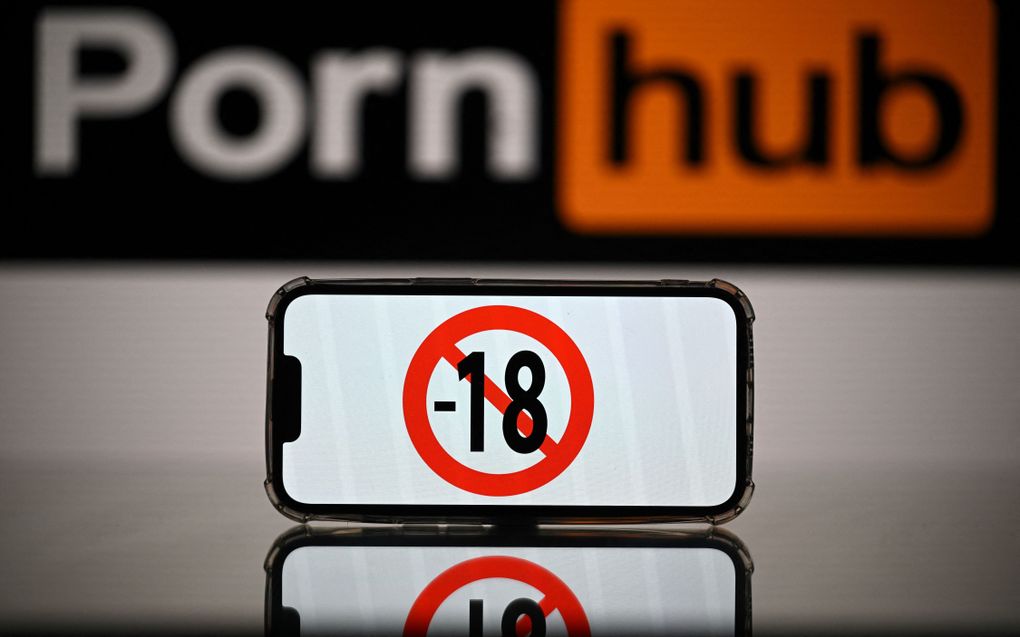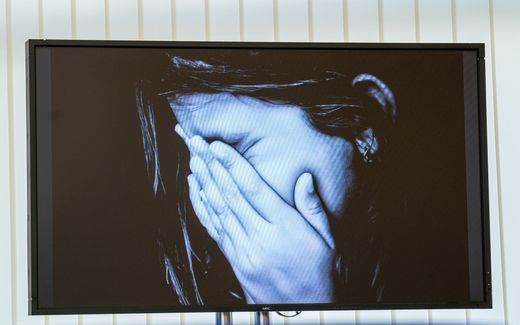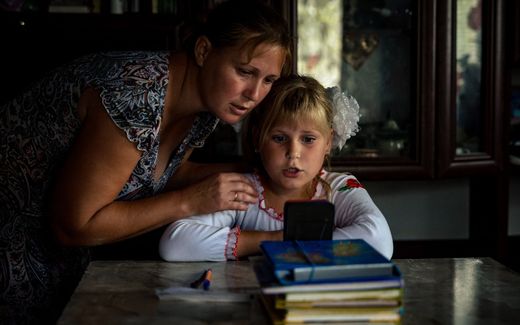Porn is a huge problem, but it is still taboo in the church
16-05-2025
Christian Life
Kees van den Brink, RD

A smartphone shows the "minor child sign" while the logo of the international porn site, Pornhub stands in the background. Pornhub had seen at least 470 million visitors from France in January 2024, according to Statista. Photo AFP, Lionel Bonaventure
Christian Life
As much as 75 per cent of Dutch boys between the ages of 13 and 24 watch porn every month, according to research by Rutgers, a Dutch expert centre for sexuality and sexual health.
Stay up to date with Christian news in Europe? Sign up for CNE's newsletter.
However, pornography is still far too much of a taboo in churches, according to three Christian organisations.
Baptist pastor Maurits Luth (coordinator for the denomination Unie-ABC) and Geranne Tamminga (Theological University Utrecht) represent the organisations in the interview. The third organisation is Scharlaken Koord, a project that provides help to prostitutes. Together, they had a study meeting around the porn phenomenon.
The focus of the study meeting was making pornography a topic of discussion on the pulpit and in pastoral conversations. But that’s not all. Rev. Luth: “I am surprised by the silence surrounding human trafficking. As a church, we want fair trade coffee beans, but we don’t seem to care about sex tourism, which is at the root of pornography.”
Some people believe that watching porn is a part of normal sexual development, while others see it as adultery. What is your view?
Luth: “I also notice this nonchalance among colleague pastors: we’ve all been young, what’s the big deal? Others are more normative: a woman can divorce her husband if he watches porn. I think we need to find a middle ground. Pastoral care is always tailor-made.
Genesis 3 shows how we sinned in our nakedness. God mercifully delays His judgment and first asks a question. Jesus does the same when He first listens to the disciples on the road to Emmaus. When it comes to pornography, we must also listen to each other with a suspended judgment. The danger is that you speak so judgmentally about pornography that you discourage open conversation.”
Tamminga: “Pornography is a form of sexuality that damages relationships and goes against what God asks of us. At the same time, we live in a reality where not all relationships are good. We have to deal with that. We need to have difficult conversations and not hide from reality and the figures. Porn addiction is just as prevalent in the church as it is in society.”
Luth: “I had a Nokia 6310 when I was younger. You could barely distinguish that those few pixels were supposed to be breasts. But now, young people are opening TikTok on their smartphones and immediately see much more. And it’s only getting worse, Jonathan Haidt writes in his book “The Anxious Generation”. I refuse to deny the problem any longer.”
Could it be that pastors themselves struggle with porn addiction and therefore avoid the subject?
Tamminga: “That could be true. However, there is also a prejudice that young people are not interested in discussing these issues. I don’t believe that. Young people who want to be Christians long for clear life rules. I know of a church where young people took the initiative to ask an older church member with knowledge of the subject to talk to them about sexuality and pornography. Their parents are often still caught up in the taboo surrounding these issues.”
Luth: “For Generation Z, it’s a given that pornography is just two clicks away on their phones. That lowers the threshold for seeking help. I know a group of boys aged 17 and 18 who talk about this once a week to keep each other on track.”
Is it a prerequisite that a pastor be open about his sexual struggles to create a vulnerable atmosphere in the congregation?
Tamminga: “That’s possible, but then the pastor must have reflected on his own development. You shouldn’t just pour your heart out to the congregation every Sunday.”
Luth: “I see pastoral care as bringing God’s story into people’s life stories. Sometimes your own story can serve that purpose.”
What are the practical issues that pastors encounter in their pastoral care and preaching when dealing with pornography?
Luth: “Where should I start? Some pastors are sounding boards for three, four, or five men from the congregation. But who counsels their wives? When does a man become too dependent on the pastor? How many men can you counsel at the same time? Who talks to women addicted to pornography? When do you refer someone to therapy, and if so, which kind? That’s what I mean: we are already far behind.”
Tamminga: “In my church, evenings about sexuality were initially poorly attended. You could say that nobody wants to talk about it. However, you can also create safer settings or have other speakers from within or outside the congregation. Don’t fear difficult questions because they will remain a serious conversation. Ultimately, this resulted in some wonderful evenings of discussion for us.”
Can you give us a concrete tip: how should a minister respond when a church member brings up pornography?
Tamminga: “Listen.”
Luth: “In any case, he must have his own spiritual health in order before that. Your congregation must have a safe culture, but where can you share your struggles as a pastor? First, lead yourself.”
This article was translated by CNE.news and published by the Dutch daily Reformatorisch Dagblad on May 12, 2025
Related Articles









